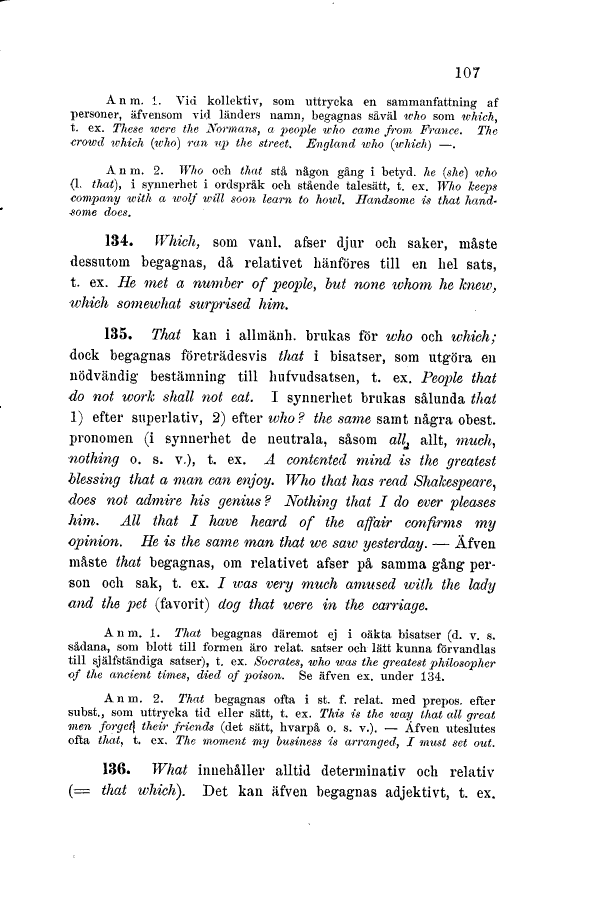
Full resolution (TIFF) - On this page / på denna sida - 4. Pronomen.

<< prev. page << föreg. sida << >> nästa sida >> next page >>
Below is the raw OCR text
from the above scanned image.
Do you see an error? Proofread the page now!
Här nedan syns maskintolkade texten från faksimilbilden ovan.
Ser du något fel? Korrekturläs sidan nu!
This page has been proofread at least once.
(diff)
(history)
Denna sida har korrekturlästs minst en gång.
(skillnad)
(historik)
107
Anm. 1. Vid kollektiv, som uttrycka en sammanfattning af
personer, äfvensom vid länders namn, begagnas såväl who som which,
t. ex. These were the Normans, a people who came from France. The
crowd which (who) ran up the street. England who (which) –.
Anm. 2. Who och that stå någon gång i betyd. he (she) who
(l. that), i synnerhet i ordspråk och stående talesätt, t. ex. Who
keeps company with a wolf will soon learn to howl. Handsome is that
handsome does.
134. Which, som vanl. afser djur och saker, måste
dessutom begagnas, då relativet hänföres till en hel sats,
t. ex. He met a number of people, but none whom he knew,
which somewhat surprised him.
135. That kan i allmänh. brukas för who och which;
dock begagnas företrädesvis that i bisatser, som utgöra en
nödvändig bestämning till hufvudsatsen, t. ex. People that
do not work shall not eat. I synnerhet brukas sålunda that
1) efter superlativ, 2) efter who? the same samt några obest.
pronomen (i synnerhet de neutrala, såsom all, allt, much,
nothing o. s. v.), t. ex. A contented mind is the greatest
blessing that a man can enjoy. Who that has read Shakespeare,
does not admire his genius? Nothing that I do ever pleases
him. All that I have heard of the affair confirms my
opinion. He is the same man that we saw yesterday. - Äfven
måste that begagnas, om relativet afser på samma gång person
och sak, t. ex. I was very much amused with the lady
and the pet (favorit) dog that were in the carriage.
Anm. 1. That begagnas däremot ej i oäkta bisatser (d. v. s.
sådana, som blott till formen äro relat. satser och lätt kunna förvandlas
till själfständiga satser), t. ex. Socrates, who was the greatest philosopher
of the ancient times, died of poison. Se äfven ex. under 134.
Anm. 2. That begagnas ofta i st. f. relat. med prepos. efter
subst., som uttrycka tid eller sätt, t. ex. This is the way that all great
men forget their friends (det sätt, hvarpå o. s. v.). - Äfven uteslutes
ofta that, t. ex. The moment my business is arranged, I must set out.
136. What innehåller alltid determinativ och relativ
(= that which). Det kan äfven begagnas adjektivt, t. ex.
<< prev. page << föreg. sida << >> nästa sida >> next page >>